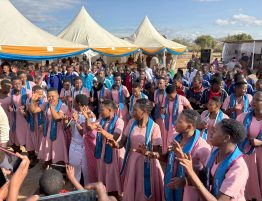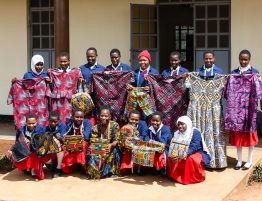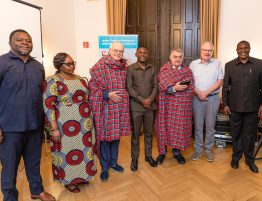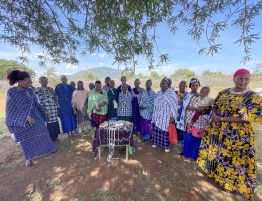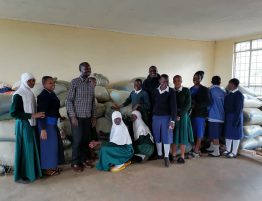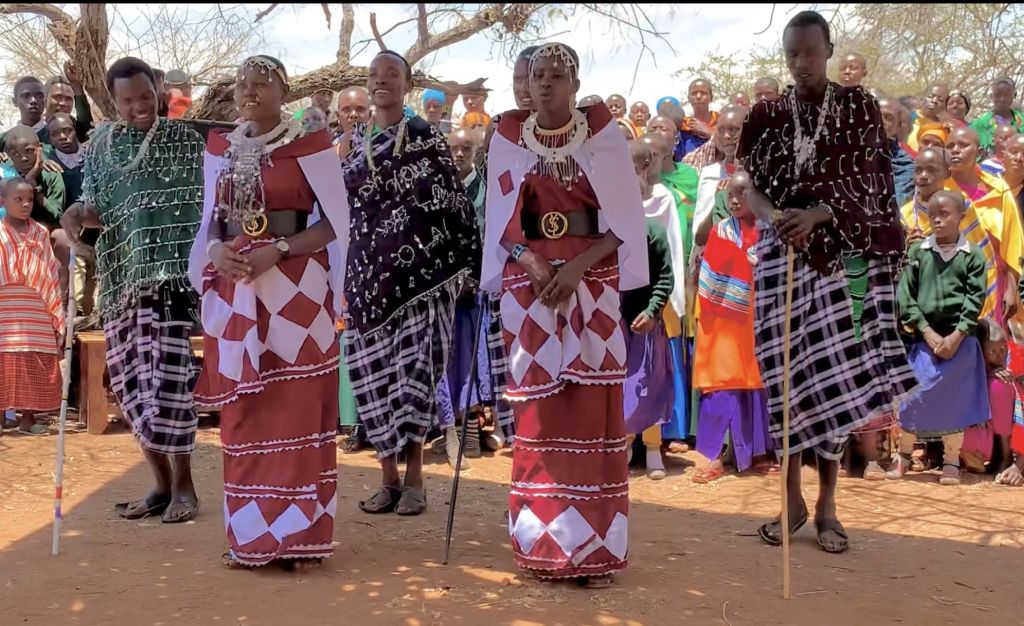
A personal perspective on the women’s work of ECLAT and upendo – Result of my project trip to Tanzania in October
Sabine Buchmüller
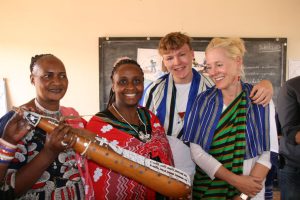 As my husband is a founding member of upendo, I have been aware of the development work of upendo and ECLAT for years. It was only at the beginning of September that I was able to listen to Catherine Maguzu’s reports on her women’s work at ECLAT at the upendo information event. But all these descriptions and pictures could not convey the impressions that a personal immersion in the world of the Maasai gave me. Before, it was just pictures and oral stories that somehow made me thoughtful and concerned just at the moment of confrontation, but which were immediately pushed aside and forgotten because they had nothing to do with my personal everyday problems. Moreover, women’s work has so far played a subordinate role for me as a European woman of our time who is independent, working as a civil servant. The profession of primary school teacher is a women’s domain anyway, in which I do not have to campaign for equal pay or women’s quotas. The position of the equal opportunities commissioner and the gendering prescribed in certificates seemed downright ridiculous to me until then. But this trip was to teach me how important every smallest development step is for an equal life for women and how slowly, small-step by small-step and laboriously these rights have to be worked out.
As my husband is a founding member of upendo, I have been aware of the development work of upendo and ECLAT for years. It was only at the beginning of September that I was able to listen to Catherine Maguzu’s reports on her women’s work at ECLAT at the upendo information event. But all these descriptions and pictures could not convey the impressions that a personal immersion in the world of the Maasai gave me. Before, it was just pictures and oral stories that somehow made me thoughtful and concerned just at the moment of confrontation, but which were immediately pushed aside and forgotten because they had nothing to do with my personal everyday problems. Moreover, women’s work has so far played a subordinate role for me as a European woman of our time who is independent, working as a civil servant. The profession of primary school teacher is a women’s domain anyway, in which I do not have to campaign for equal pay or women’s quotas. The position of the equal opportunities commissioner and the gendering prescribed in certificates seemed downright ridiculous to me until then. But this trip was to teach me how important every smallest development step is for an equal life for women and how slowly, small-step by small-step and laboriously these rights have to be worked out.
Our trip offered us insights into the multi-layered women’s work of ECLAT. At the beginning of our trip Philomena and Catherine took us to three of their women’s groups. In all the groups we were warmly welcomed by women of all ages. Some were still rather children, already carrying their own children in scarves on their bodies. When we asked, it turned out that these children were around the age of my fourteen-year-old son, but they did not know their exact date of birth.
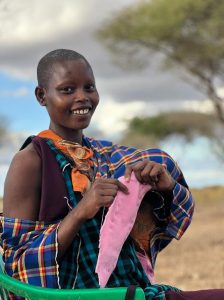
Junge Mutter
They had never seen a school from the inside and attending school with a child would be denied them for the rest of their life. They proudly presented the profits they had earned through so-called micro-credits from ECLAT, products such as honey, soap, and flour. Until then, money was exclusively a man’s business. I admit that at first glance, these seemed to me to be only small things, the sale of which can certainly only generate a small revenue. At second glance, however, it is an opportunity to step out of the previous isolated role of women without schooling, to produce a product, to trade and to learn how to handle money. Skills that thanks to ECLAT they are now allowed to learn in order to earn their own income.
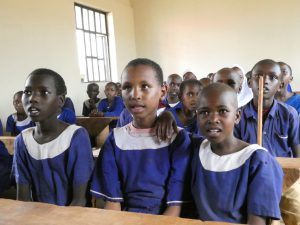
Im neuen Klassenraum in Digodigo
Nevertheless, all ECLAT women’s work also requires work with men. Every step in the development process is only possible with the consent of the men. The conviction of men can only succeed through a sensitive, respectful approach to the culture of the Maasai. Therefore, I consider the cooperation of upendo with the local organisation ECLAT to be essential, especially in the field of women’s work. This became particularly clear in the opening event of the family planning campaign in Lorokare to educate people about contraception and how to use it. ECLAT first of all did important work to convince the tribal elders, who due to their high reputation are important multipliers for the success of the campaign. In Lorokare, we were allowed to be guests and admire the wonderful dances and songs of a Maasai choir in its colourful robes. The song lyrics were written especially for this event and deal with the consequences of too many children for women who have to provide enough food, clothing and health. Schooling is also not affordable for too many children. Songs reach our souls in a completely different way than spoken and readout texts. Even though I did not understand the lyrics of the songs in Kiswahili, the message and mood to be conveyed was clearly perceptible to me as well.
I was most moved by the encounters with the Maasai girls and women, whose lives have been transformed in an exemplary way through education, and this partly with the support of ECLAT and upendo. Little Pendo had hurriedly made her way home from school to welcome us in her boma. It was my first visit to a Maasai boma. The oppressive heat, dryness, huts made of cow dung and too many children in cramped living space were contrasted by a little girl in school uniform as a ray of hope, who now was given a perspective for a future outside a boma. Equally impressive is the life of Selina Daniel, who thanks to her education found her way to ECLAT as a staff member and ultimately helped her village to have a school building. Selina also showed us her parental boma in Lemugur, where her little siblings still live. When I came face to face with this confident, elegant, English-speaking Maasai woman in her birthplace, I was struck by the incredible development she had undergone through education. Equally formative was the encounter with the student Mamaule, who took her destiny into her own hands years ago and sought help from ECLAT and upendo and is now aspiring to be a teacher, which of course was particularly moving to me.
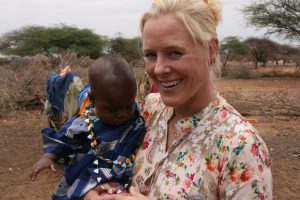
Mit Selinas jüngster Schwester im Boma in Lemugur
Ultimately, however, the education of the entire Maasai population is the key to further development. The women’s work of ECLAT and upendo does not only involve the education of women’s groups and families, but in the long term and in a sustainable way, especially the school education of as many children as possible; boys as well as girls. Only through education made accessible for many can a real change in the mindset of the new generation develop, and this became evident to me during our visits and the attended handover ceremonies of the primary schools built or renovated by ECLAT and upendo in Tayei, Lemugur, Digodigo and Sanjan. Many girls are already sitting in the filled student benches.
My perspective on women’s rights and women’s work has changed fundamentally through this trip. I thank all the women in Europe who, through their fighting spirit and courage, have made this equal life possible for me, which I personally can gratefully accept. Our task now is to preserve these rights – and we have the opportunity to support organisations like ECLAT and upendo in their women’s work.


